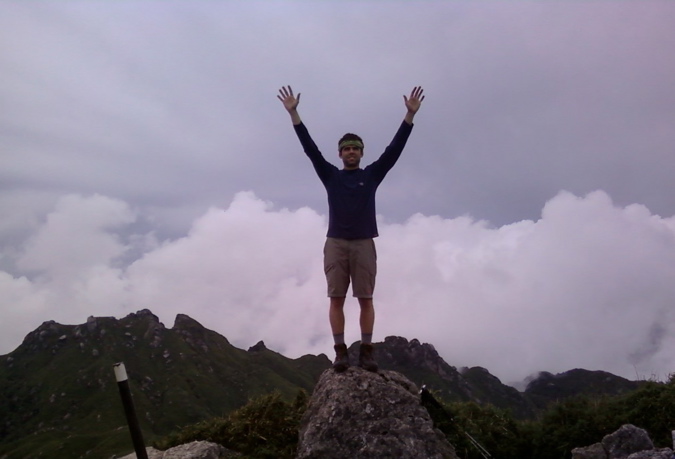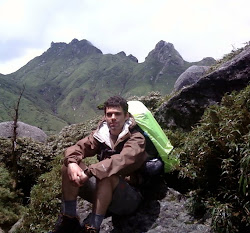






It's been a while since my last update, so I ought to apologize to you all for my lack of consistency. It's not a great excuse, but I have been very busy teaching. I now teach 6 hours a day, five days a week--and that's only teaching hours not including preparation or grading! I've been getting a bit of overtime pay, though, so that compensates somewhat.
I didn't intend to write about work, but while I'm on the subject...things have kind of normalized since I last wrote about teaching. I don't love the work, and it's still stressful, but I'm more accustomed to it now and the weeks fly by. Assuming I stay another year, which I'm seriously considering, I may well switch to a public school or possibly even teach conversation classes at a university. Although the students' level of English is generally higher at a hagwon (a private academy such as the one I'm teaching at) there tends to be a lot of added stress because it is in the private sector. English is big money in Korea, and lots of people invest in the better academies. So that translates to a lot of pressure on the staff and teachers to perform at a high level to keep up the school's reputation. And it's helpful to keep in mind that actually learning English is only a small part of what's going on at the English hagwons. Whole books could be written about this subject (maybe they already have).
But getting to my intended subject. Recently I have been aching to get away from city sounds, smells, and craziness; just to take a short break, breathe fresh air and listen to nature's sounds (and also the sounds of people living more in tune with nature). This weekend I had three days, so my friend Sandra and I planned to head to her sister's mother-in-law's house in Goesan, which is the province just to the south of where I live, almost in the center of South Korea; and also to just drive around and explore the surrounding countryside.
On Friday, it took us about 5 hours to drive what would have normally taken two hours or less. I guess everyone had the same idea as us, to get out of the city for the three-day weekend. By the time we finally arrived, it was time to look for a place to camp or stay, so after another hour or two of looking around, finding nothing, and exploring a nice waterfall along the way, we pulled into the yard of a house with two older ladies sitting in front to inquire. It turned out there was nowhere around we could stay, but the lady whose house it was told us we could camp right in her yard. She was very friendly. She even let us use her outdoor faucet to wash our dishes and eat on her ondol (raised wooden platform for sitting, lounging, and eating) in front of the house. But we had seen some picnic tables just a few meters down the road on the opposite side, next to a stream, so we chose that spot to cook our dinner and relax for an hour or two before bed.
The following day, contrary to the forecast on wunderground.com (I think I'll have to find a more reliable source for the weather in Korea), it started raining early and rained steadily, though lightly, all day. But that didn't stop us from exploring another river valley in the morning before driving to meet Sandra's sister at the mother-in-law's house just up the road. To get to the house we had to drive several miles up a single-lane country road (unlike on the highway, we met no cars here) flanked by fields of rice, young pepper plants, and other freshly-planted crops. At the end of the lane, the road turned 90 degrees and went up an embankment with a tall, narrow, ivy-covered barn one side. We parked beside the barn and got out. Glancing up the driveway, I could see other low structures peeking out over stone walls and amongst herbage. From the very first, the property was the epitome of "organic": it was clear that every stage of it was built in harmony and cooperation with the land. With the exception of the new house, built 20 years ago, and perhaps the metal farm implements and window panes, all of the structures and items seemed to be built from stuff found right on the land. The old house and barns were made of wood and mud bricks, the plows and baskets from the local wood, and the roofs and beehives fashioned from rice-straw. The four or so old buildings and the new house to their rear (also small) were all arranged in an irregular row along the drive and tucked into the hillside, with trees in back and shrubs in front for shelter, and beyond those, their fields, where the grandfather, now 80 years old, still works every day.
It turned out we were not the only guests. Sandra's sister's sister-in-law and her husband were also there, besides Sandra's sister, husband, and three nephews. (The only people actually living at the house nowadays are the two grandparents, but they seem to like entertaining; I was informed that on special holidays and occasions there can be as many as 40 guests, all family and extended family, and most of them stay for a day or two, packed like sardines, sleeping on the many mats laid out from wall to wall in the small living room and three bedrooms.) We arrived just before dinner, which upon our arrival was quickly set up in the greenhouse just in front of the new house. It was to be an outdoor dinner--perfect! We handed the samgeopsal (fresh slices of pork similar to bacon) we had brought to the boys who were tending the grill and added it to the slices of duck already being stewed. Soon we were seated on the floor at low tables and feasting on the many side dishes along with rice, soup, and meat. After dinner, it didn't take us long to get tired, and after setting up the tent in the greenhouse for the boys, we all headed to bed. I felt privileged to have my own room, even though I offered to sleep with the boys. There are no beds in the house; everyone sleeps on the floor on mats like thick padded quilts with blankets as coverings. I found it very comfortable and slept soundly. (An interesting aside: We spotted a bright green tree frog in the house. I caught it and let it go outside. That was a first!)
The next day was Sunday, but I guess the day starts early in the country, because by 6:30 everyone was up and about. At 7:30 I was seated, feeling a bit groggy, at the table with all the family. Unlike in the States, breakfast in Korea is not much different from any other meal: we ate rice, fermented-soypaste soup (toenjang jjiggae), and many sidedishes such as different roots and leaves of plants (for example, pepper plant leaves), each having been fermented or prepared in a unique way. It's very healthy food, I reckon. Afterwards, we geared up for a hike by a beautiful reservoir nearby. I have included some pictures of the setting here, but it's hard to do justice to the beauty of the place. The fog rolled across the hills, which were in turn reflected in the emerald-colored lake. The path and landscaping around the lake was so nicely done as to actually enhance the scenery. A rare jewel, that place, and not nearly as frequented as other areas. On the far end of the path (though not of the reservoir, which stretched farther) we rode a ferry back. Besides one other small craft, it was the only other boat I saw the whole time. I wished I had my canoe from back home, because this would have been the perfect spot for it. I'm not sure if boats were not allowed there or if the locals were just not into boating. On our return we all sat down for a lunch much resembling our breakfast, but with the addition of pajon, which is a traditional "pancake" made with flour and onion grass--delicious! After a short nap, we packed the car and headed back. This time Sandra's sister and younger nephew rode with us. (Her brother-in-law and other two nephews rode in their Kia Sportage.)
All in all, the weekend was everything I had hoped it would be, probably more. I really gained a new appreciation for Korean country life, and country living in general. It made me seriously reflect once again on my own life and values. I could picture myself living like that. However, I realize that a lot of generational knowledge and experience goes into it, and you don't learn how to live like that in a few weeks or even a few years. Part of their livelyhood, besides their crops, came from the many bees they kept which produced honey for them. Many of the beehouses were built in traditional fashion, from the hollowed-out cross section of a small log roofed and insulated with dried rice plants (see photo above). The honey is so precious that one large jar (it looked to be about a liter) sells, if I got it right, for about USD $300! They told me to eat a lot while I was there, as it will likely be a while before I get real honey again. Another product from the bees is the honeycomb, which is basically just wax and honey, and they chew on it, suck down the honey and spit out the wax. It's delicious, and they gave me a pound or so to take home! They informed me that chewing on the stuff helps people who have stomach problems.
It's getting late, so that will have do for now. I have gone on a few other hiking trips and excursions since my previous entry, but they weren't anything too unique. One thing that is perhaps worth relating briefly is last Friday night. After work (we finish at 10 pm), I joined some of the other teachers at my school for a night out. After dinner, we eventually ended up at a noraebang (picture a small, private karaoke room with good sound) where we stayed till 5am. Afterwards, one of the guys got the idea to hike Suri mountain and catch the sunrise! I don't think he was serious, but another teacher and I both said we would be up for it. So we changed over and met up a few minutes later. By the time we reached the top, the sun was high in the sky. The climb also revitalized us a bit, so we hiked for a few more hours before heading back and crashing. That was a night (and morning) to remember!
One more note before I sign out. For summer break, I have 9 days at the end of July, and I've already bought my plane ticket for...
Yakushima.
If you're curious, look it up. Otherwise, I'm sure I'll be posting about it a few months from now (though hopefully my next blog entry will be before that!). I hope you are all doing well. I'd really love to hear from any of you, and I apologize to those I haven't responded to in a while. Hopefully I will correct that soon.
Until next time, be at peace.





Thanks for this great post, Ted. What a magical weekend. Makes me want to clone myself and have adventures like this. Of course, I'd have to clone a younger version of myself.
ReplyDeletetheo i am Joris from Granada. I lived two years in Korea before. I lived in Kyongido, kwagnung very near to the grave of king Sejo.
ReplyDelete